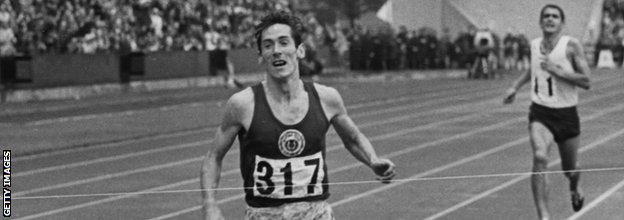Commonwealth gold hero Lachie Stewart on losing a leg 50 years on from glory
- Published
'I've been keeping not bad, even though I'm minus the bottom of my leg'
"I've got my leg there, I call it my 'peg-leg'. Once I get that on and I'm walking about, I can sail my model boats and I'll see if I can get a parrot for my shoulder."
Lachie Stewart may have lost a limb, but not his sense of humour.
The 77-year-old was once a Scottish Commonwealth Games hero who trained for marathons in sandshoes during his lunch breaks.
But instead of celebrating what should have been the 50th anniversary year of his 10,000m gold medal, the pensioner had to make the harrowing decision to have the lower half of his leg amputated due to complications with diabetes.
"I had an ulcer between my second and third toe and it didn't seem to heal too well," he told BBC Scotland.
"It quickly went from that to the doctor saying I can either live with the pain, which was unbelievable, or we can amputate below the knee. I said to him right away to just to take the bottom of the leg off because I just couldn't stand the pain."
'I was well looked after'

Stewart finished several metres ahead of Ron Clarke to claim his gold
Stewart's calling for athletics first reached him at the age of 14. Local running clubs fuelled his passion for long-distance running, graduating up to the renowned Shettleston Harriers club on his way to Commonwealth glory.
His finest moment came in front of a home crowd in 1970, with him famously looking over his shoulder as he sped by Australia's Ron Clarke, a multiple world champion and overwhelming favourite, in Edinburgh.
A member of the Scottish Sports Hall of Fame, Stewart made 10 appearances in the cross country at what would become the World Championships, claimed the title of Scottish 10-mile champion four times, Scottish six-mile champion twice and Scottish three-mile champion three times.
Fifty years on and coping with losing his leg in the middle of a global pandemic, the West Dunbartonshire pensioner believes sport has helped him to cope with the transition in his life.
"Sport makes you more determined," he said.
"I don't have any hang-ups about losing the leg. I'm adapting to the prosthetic one and the doctors and nurses were great. I was well looked after."